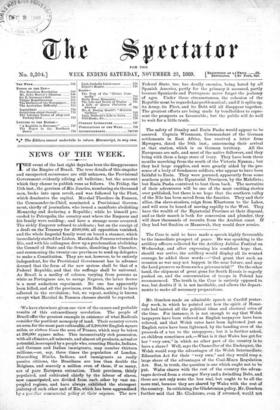We have elsewhere given our view of the causes and
probable results of this extraordinary revolution. The people of Brazil offer the greatest example in existence of what Radicals consider the pestilent monopoly of land. Their country covers an area, for the most part culturable, of 3,200,000 English square miles, or sixteen times the area of-France, which may be taken at 200,000 square miles. This inconceivably rich possession, with all climates, all minerals, and almost all products, actual or potential, is occupied by a people who, counting Blacks, Indians, and German and Italian immigrants, may number thirteen millions,—or, say, three times the population of London. Discarding Blacks, Indiana, and immigrants as really passive citizens, the Brazilians are less than double the Belgians, and scarcely a million even of these, if so many, are of pure European extraction. Their provinces, thinly populated, and cultivated chiefly by the labour of slaves, now emancipated, are divided from each other by vast un- peopled regions, and have always exhibited the strongest jealousy of each other and of Rio, which has been aggrandised by a pcculiar commercial policy at their expense. The new
Federal State, too, has deadly enemies, being hated by all Spanish America, partly for the primacy it assumed, partly because Spaniards and Portuguese never forget the jealousy of ages. Under these circumstances, the cohesion of the Republic must be regarded,as problematical; and if it splits up, its Army, its Fleet, and its Debt will all disappear together. The greatest efforts are being made by bondholders to repre- sent the prospects as favourable; but the public will do well to wait for a little truth.






































